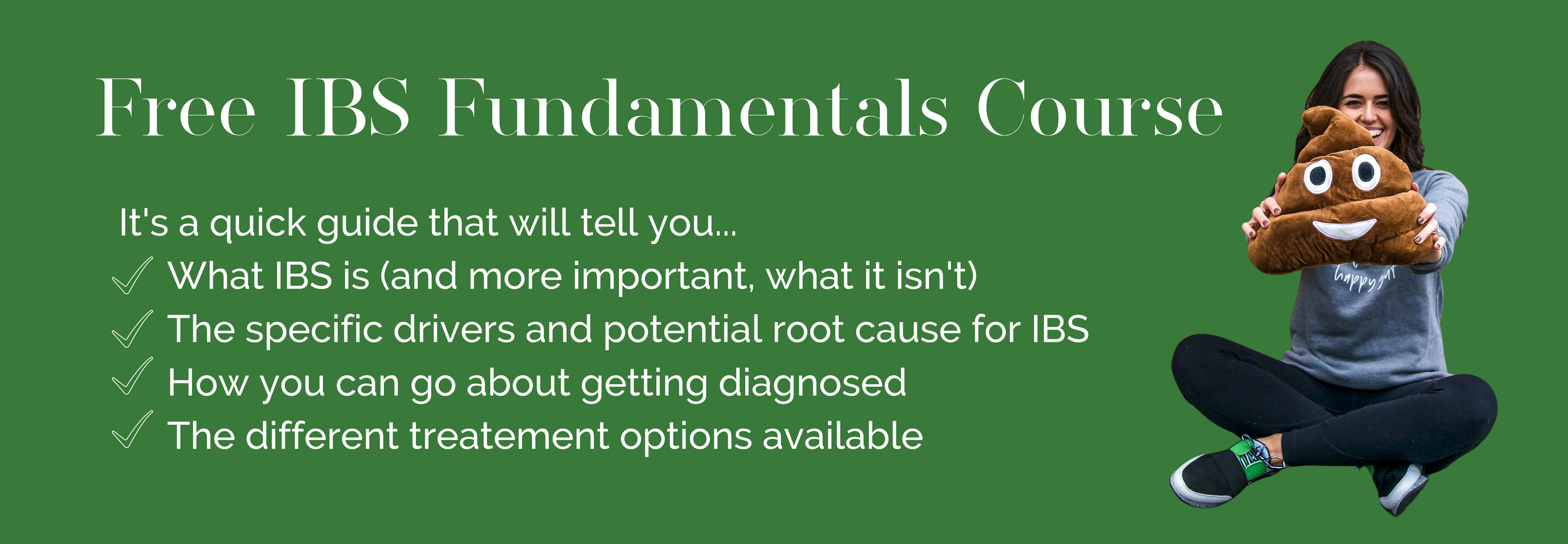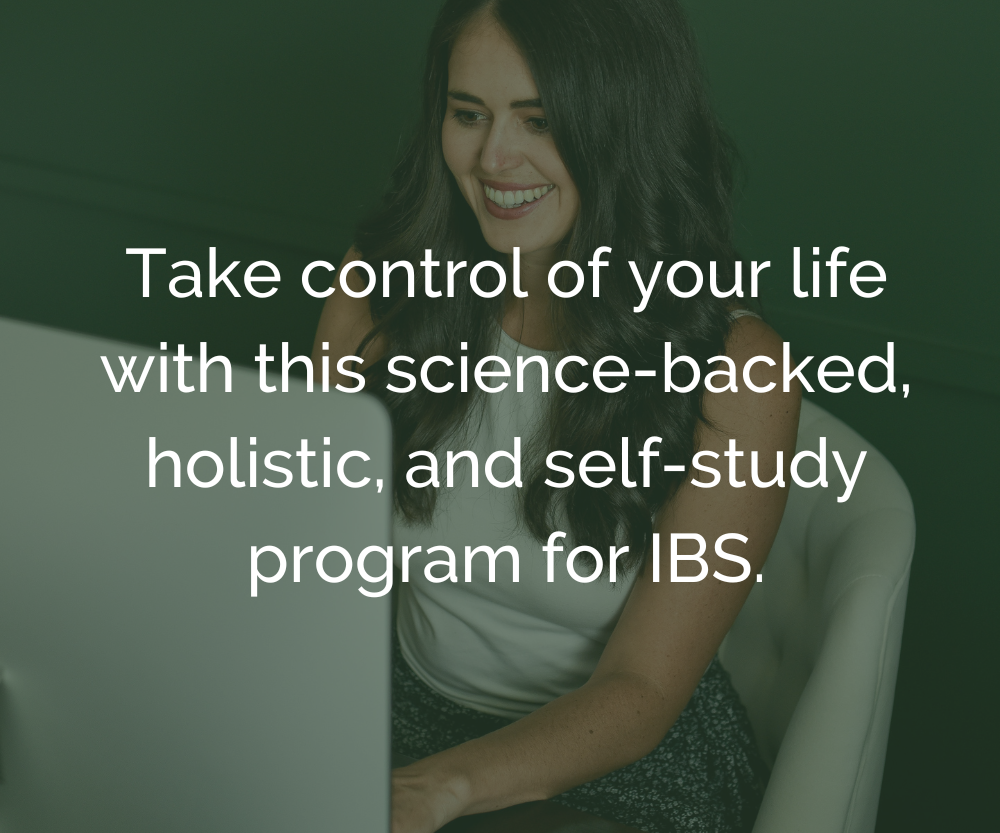What does self-care mean for IBS?
Do you find it hard to take care of your body with irritable bowel syndrome (IBS)?
If so, you’re not alone. It can be tricky to care for your body if you feel like your body has betrayed you or isn’t working with you.
The tricky part is that managing IBS and keeping symptoms down does require you to practice self-care.
So what do you do? Listen to The Gut Show episode on this topic on iTunes or Spotify, watch the video below, or keep reading to learn how to think about self care and begin practicing this, no matter where your IBS is at or how you feel about your body.
What is the goal of self-care?
To lay a foundation, self-care is the practice of taking care of oneself in order to maintain physical, mental, and emotional health.
The goal of self care is to promote well-being and improve overall quality of life. This means that if what you are doing for your own self care isn’t improve your life in any way, then it’s not working for you and you may be wasting your time.
What is the goal of self-care?
To lay a foundation, self-care is the practice of taking care of oneself in order to maintain physical, mental, and emotional health.
The goal of self care is to promote well-being and improve overall quality of life. This means that if what you are doing for your own self care isn’t improve your life in any way, then it’s not working for you and you may be wasting your time.
What’s your poop personality? Find out here!
What can self-care look like?
Having “down time” after work where you scroll social media and end up more anxious than when you started.
You choose to “rest” but you’re really neglecting other things that need to be done, causing more overwhelm and stress.
You exercise as a punishment to your body and push yourself versus check in with your body and what it needs in the moment.
There is a very thin line between self care and self sabotage (aka working against yourself), so that’s why a reframe of what self care actually means is so important.
Tips to change how you think about and implement self care in your life:
Tip #1: Self care should be rooted in self compassion
Self-compassion involves treating oneself with kindness, care, and understanding, even in difficult or stressful situations. It involves recognizing that everyone experiences suffering and setbacks and that it is a normal part of life. The practice of self-compassion involves three key components:
Self-kindness: This involves being kind and understanding towards oneself, rather than being self-critical or judgmental. It involves recognizing that everyone makes mistakes and that it is important to treat oneself with care and compassion, rather than with criticism or harshness.
Common humanity: This involves recognizing that suffering and setbacks are a normal part of life and that everyone experiences them. It involves recognizing that we are all human and that it is natural to have difficult thoughts and emotions.
Mindfulness: This involves being present in the moment and accepting one's thoughts and emotions without judgment. It involves observing one's experiences without trying to change or fix them, and instead, acknowledging and accepting them as they are.
Self compassion should be the “why” behind the “what” of self care. This means you are working as a team with your body and you have the true intention of improved health and quality of life in mind.
Tip #2: Self care should include what your body NEEDS
There is a misleading image of self care online, that makes it look like the luxurious, sexy actions that you may want. This includes the long baths and massages you may see people share with a self care hashtag.
While doing what you want can be self care, priority should be given to the daily non-negotiables your body truly NEEDS to function at its best. This includes sleep, eating consistent meals, drinking water, and basic hygiene.
This can go a step further to your specific needs for improved health, which may include eating enough fiber, movement and exercise, taking breaks during the day, mindfulness practices, therapy, etc.
This part of self care may not be as fun or enjoyable, but this is the part where you are truly taking care of your body. When this is rooted in self compassion and kindness towards yourself, it becomes less about punishment and more about care.
Tip #3: Self care should include some intuition
Once your basic needs are met, there’s space to lean into your intuition and what you know you want or need in the moment. This is where you may call a friend, go for a walk in nature, take the long bath, go to a fitness class, turn on a show you love, etc.
You only build intuition by first practicing mindfulness. This can include meditation, visualization, and mindfulness activities like using your senses and grounding into your environment (pressing your bare feet into the ground).
Tip #4: Self care should include both structure and flexibility
When building out your self care, you want to start with structure and discipline. This is where your NEEDS fit in.
An example of a structured self care plan:
Sleep 7-9 hours per day
Eat 3 balanced meats per day
Walk at least 8,000 steps per day by taking a morning, lunch, and evening walk
Drink 64 oz of water per day
Exercise 3 days per week on Monday, Wednesday, and Friday after work
In addition to a structured plan, there should be flexibility to leave room for intuition.
This can look like:
Block out 15 minutes each morning for mindfulness and connection: could journal, do a meditation, go for a walk, practice grounding
Set aside 2 nights per week to enjoy hobbies and self care at home: could play an instrument, read a book, take a bath, watch a favorite show, etc.
Set aside 1 night per week to connect with others: could go to a networking event, call a friend, go to dinner with a new or old friend, go on a date, get ice cream with your kid, etc.
Flexibility doesn’t always happen right away in your life, so you may have to create structure by planning time for flexibility and then giving yourself permission in the moment to decide what you want or need most during that time.
So where should you start? Map out your NEEDS and the daily non-negotiables (your structure) and then plan space at least once per week for flexibility and give yourself a menu if you feel like you need options to choose from.
Are you frustrated with your IBS symptoms? Do you desire to be confident in your food choices? Do you want to have a healthier relationship with your body and diet? Are you ready to take control of your IBS?



